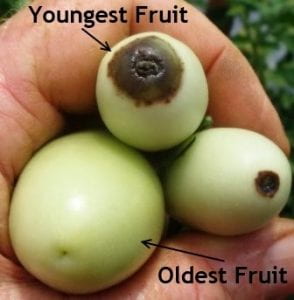Jerry Brust, IPM Vegetable Specialist, University of Maryland; jbrust@umd.edu
This summer has been unusual in that it has been about normal for temperatures, but we have had a large number of cloudy days and, in some areas of the mid-Atlantic, much greater rainfall amounts. Long periods of overcast skies cause a slowdown of transpiration in the plant and waterlogged soils also slow water movement into the plant. Calcium (Ca) moves to the plant via mass flow, i.e., where dissolved minerals like calcium move to the root in soil water that is flowing towards the roots. As it passes through the plant Ca is deposited in tiny amounts into the fruit. If anything slows or interrupts this stream the tiny amount of Ca needed at that moment is not deposited and the area furthest from the top of the fruit suffers—resulting in blossom end rot (BER).
I have seen more BER this year on a large number of vegetables than I have in the past 5 years (Fig. 1). Figure 2 shows how precise and constant the Ca flow in a plant has to be in order to supply just the right amount of Ca at the right time. The large fruit on this particular plant developed before there was a Ca interruption, but the fruit a little younger suffered a Ca interruption, with the smallest (youngest) fruit suffering the greatest Ca interruption. Tissue analysis from this same plant showed that calcium was in the high range when the blossom end rot took place, demonstrating the importance of irrigation and water supply to reduce blossom end rot and not necessarily the level of calcium in the soil. There is not much you can do about overcast skies and heavy rains. You could add a foliar calcium nutrient spray weekly or so. It helps a little and sometimes a little is all you need.
 Figure 2. Older larger fruit received enough Ca, but younger (smaller) fruit did not
Figure 2. Older larger fruit received enough Ca, but younger (smaller) fruit did not

